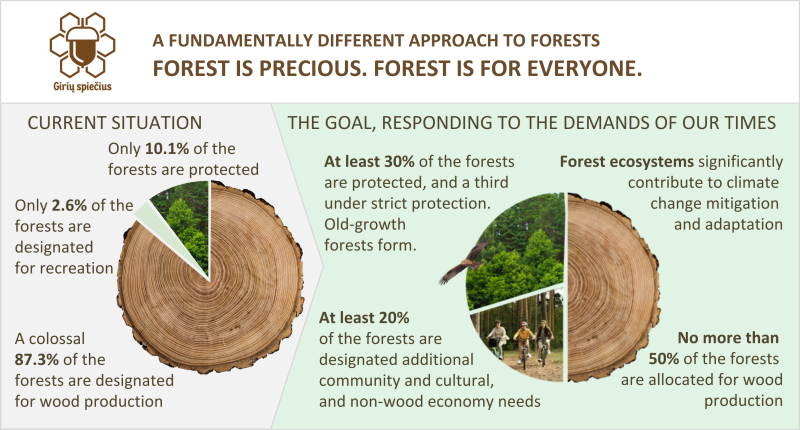Girių spiečius – (En. Forest Swarm) is a group of organizations and individuals united to seek ecologically, socially and economically balanced, nature-friendly forest policy. Originally gathered in 2019, it is once again swarming to achieve changes in Lithuania’s forest management policy.
Since 2019, politicians, the public, and representatives of the forestry industry have been in ongoing discussions. Many promises were made and there was an attempt to reach the National Forest Agreement, but to this day we have not seen the needed changes in Lithuania’s forests. This year, the government is finally taking steps to change the laws that govern forest policy. Thus, we are pushing the government even harder and demanding for forest management and protection to be enshrined in laws according to the needs of our time rather than outdated wasteful practices. We can and must unite again to clearly demonstrate to politicians and the wood industry that society needs social, climate, and nature conservation benefits provided by forests.
The current distribution of forests in Lithuania shows a significant imbalance between economic, ecological, and social forest management priorities – only 2.6% of the forests are intended for recreational use, 10.1% for ecosystem and biological diversity protection, and the remaining 87.3% are commercial forests, i.e. intended for growing raw timber. Even in protected areas, more than half of the forests are commercial and they are intensively logged with nature suffering as a result. Furthermore, the needs of communities living near forests and cultural needs of the wider society are still not taken into account. Up until now, when forming forest policy, only the production of wood and its products has been considered a viable branch of forest economics.
For Lithuanian society, forests are precious, providing benefits for physical and emotional well-being. More than half of Lithuania’s biodiversity is related to forest ecosystems. At the same time, the country’s forests contribute significantly to mitigating climate change. Therefore, forestry practices that exploit nature and destroy mature forests must change.
Main aspirations of Girių spiečius
*Primary data : „Lietuvos miškų ūkio statistika 2021“ (En. „Statistics of Lithuanian Forestry 2021”)
The fundamental precepts of the Girių spiečius for Lithuanian forests management and protection:
1. Forests dedicated to nature conservation occupy sufficient areas and ensure real protection and restoration of values.
- At least 30% of forests are dedicated to ecosystem protection.
- In protected areas, commercial clear-cuttings are not carried out, measures that meet the objectives of conservation and restoration in the principles of closer to nature forestry is practiced (in private forests, this goal is achieved gradually through buyouts and compensations).
- At least 10% of Lithuania’s forests become old-growth forests, whose protection is ensured by the nature reserve status.
- Effective and legal protection is ensured for all forests and their fragments that have the characteristics of an old-growth forest, as well as existing and potential key forest habitats.
- In all forests (not just the protected ones), economic activities are not carried out during bird migration and breeding seasons (from March to August). Adequate protection is ensured for all protected species.
2. Forest policy enables forests to mitigate the climate crisis while ensuring that climate crisis solutions do not intersect with biodiversity crisis solutions.
- CO2 absorption in the forests, both mature and aging, is increasing, including soil and subsoil. Mature forests are protected, new forests are planted.
- Adapting to the effects of climate change, multi-species and multi-age grows are formed, especially near urban settlements.
- Solutions for managing the climate crisis are combined with the preservation of biodiversity.
- A methodology is applied that comprehensively calculates CO2 emissions and absorption in the forest ecosystems and wood products. These indicators are taken into account when forming forest policy.
3. The size and benefits of social and recreational forests are increasing.
- At least 20% of the forests are additionally dedicated to social, recreational, cultural and spiritual needs.
- The public’s right to visit all forests, except for strict nature reserves, is ensured and the public is given the opportunity to obtain information about the natural and cultural heritage of the forests.
- Not only cultural and nature heritage objects are protected but also their physical and visual landscape.
- Forests growing around settlements, cities, and urbanized areas are managed by improving the microclimate and the quality of the recreational environment, avoiding clear-cutting and maintaining a permanent forest canopy.
4. Non-wood forest economy is being developed and strengthened.
- A plan for the development of a non-wood economy is created, conditions are established for ecotourism, forest bathing, beekeeping and herb gathering in forests, and other alternative forest economic activities.
- Lithuania becomes a leader in the forest-based health and nature tourism.
- The amount of forest cutting in Lithuania is gradually decreasing. The export of logs is being reduced, and timber products are being used for longer periods of time, repaired, reused, and recycled as much as possible.
5. Forest policy is being developed and implemented based on comprehensive scientific knowledge with the aim of informing and involving the public.
- The public can freely and easily obtain information about the state of the forests, planned and ongoing forest cuttings, and other activities carried out in the forests as well as participate in the decision-making process related to forests.
- Forest management is planned by taking into account ecological, social, and economic aspects, and the management documents are prepared by certified specialists who possess knowledge in all three areas.
- Forests are developed with a long-term perspective in mind. The country’s forest cover is increasing, and forests of various species and ages are being established, where they are most needed and where they provide the greatest ecological benefit, strengthening the natural framework of the country and ensuring the geo-ecological stability of the landscape.
This vision is supported by the swarming gathering of Girių spiečius.
The list of organisations, scientists, enterprises and experts is available on the main page.




